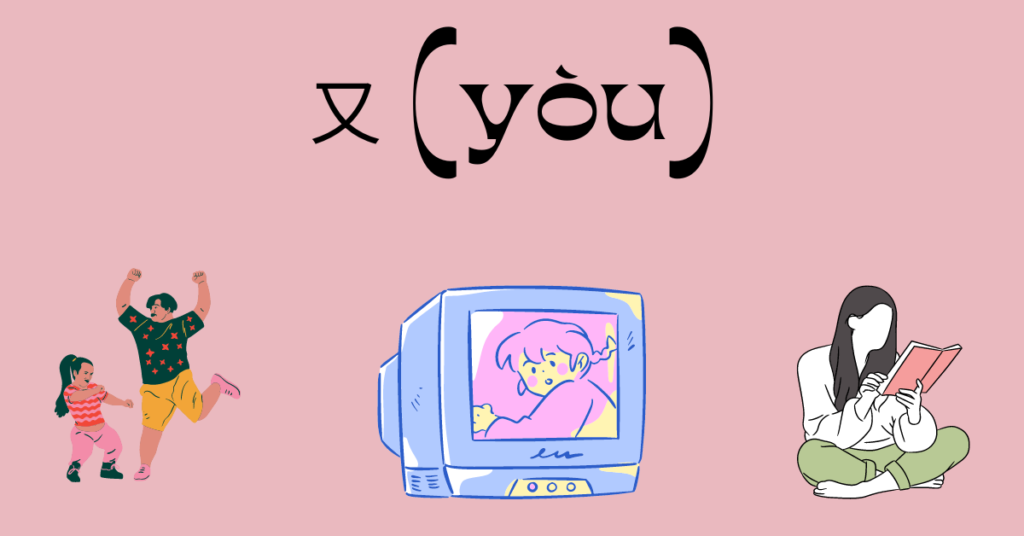
Here’s a detailed explanation of the common Chinese grammar pattern 又 (yòu) to link adjectival verbs, along with examples:
又 (yòu) to link adjectival verbs:
Structure: This pattern is used to link two adjectival verbs, indicating that both qualities or actions described by the verbs apply to the same subject.
Example: 他又高又帅 (tā yòu gāo yòu shuài) – “He is tall and handsome.”
In this pattern, 又 (yòu) is placed between two adjectival verbs, connecting them to describe multiple qualities or actions of the subject. It implies that both adjectives are applicable to the same person or thing.
This pattern is commonly used in Chinese to describe characteristics, qualities, or actions of a subject, emphasizing the presence of multiple attributes. Here are a few more examples:
- 她又聪明又有才华 (tā yòu cōngmíng yòu yǒu cáihuá) – “She is intelligent and talented.”
- 这本书又有趣又有教育意义 (zhè běn shū yòu yǒuqù yòu yǒu jiàoyù yìyì) – “This book is interesting and educational.”
- 这个电影又搞笑又感人 (zhè gè diànyǐng yòu gǎoxiào yòu gǎnrén) – “This movie is funny and touching.”
By using 又 (yòu) to link adjectival verbs, you can describe multiple qualities or actions of a subject, highlighting the presence of multiple attributes or characteristics in Chinese.
Dialogue
Person A: 我听说你又搬家了,这是第几次?
(I heard you moved again. How many times is this?)
(Wǒ tīng shuō nǐ yòu bānjiāle, zhè shì dì jǐ cì?)
Person B: 是的,这已经是第三次了。这次的房子更大更舒适。
(Yes, this is the third time. This house is bigger and more comfortable.)
(Shì de, zhè yǐjīng shì dì sān cìle. Zhè cì de fáng zǐ gēng dà gèng shūshì.)
Person A: 你好像经常换地方住,是什么原因呢?
(You seem to move frequently. What’s the reason?)
(Nǐ hǎoxiàng jīngcháng huàn dìfāng zhù, shì shénme yuányīn ne?)
Person B: 有时候是因为工作的原因,有时候是为了寻找更好的环境和便利设施。
(Sometimes it’s because of work, and other times it’s to find a better environment and convenient facilities.)
(Yǒu shíhòu shì yīnwèi gōngzuò de yuányīn, yǒu shíhòu shì wèile xúnzhǎo gèng hǎo de huánjìng hé biànlì shèshī.)
Person A: 搬家是挺辛苦的,但你也会享受新的居住体验吧?
(Moving can be quite tiring, but you must also enjoy the new living experience, right?)
(Bānjiā shì tǐng xīnkǔ de, dàn nǐ yě huì xiǎngshòu xīn de jūzhù tǐyàn ba?)
Person B: 是的,每次搬家虽然麻烦,但新的环境和新的开始总是让人兴奋。
(Yes, although moving is troublesome, the new environment and fresh start always bring excitement.)
(Shì de, měi cì bānjiā suīrán máfan, dàn xīn de huánjìng hé xīn de kāishǐ zǒng shì ràng rén xīngfèn.)
In this dialogue, the adverb “又” (yòu) is used to indicate a repeated or recurring action. Person A mentions hearing about Person B moving again and asks how many times it has happened. Person B confirms that it’s the third time and mentions that the current house is bigger and more comfortable. Person A inquires about the reason behind the frequent moves, and Person B explains that it’s sometimes due to work and other times for seeking better living conditions. Person A acknowledges the challenges of moving but suggests that Person B also enjoys the new living experiences. Person B agrees, stating that despite the hassle of moving, the new environment and fresh start are always exciting. The use of “又” emphasizes the repetitive nature of the action, in this case, moving.
Exercise
- Create your own sentence(s) using “又” (yòu).